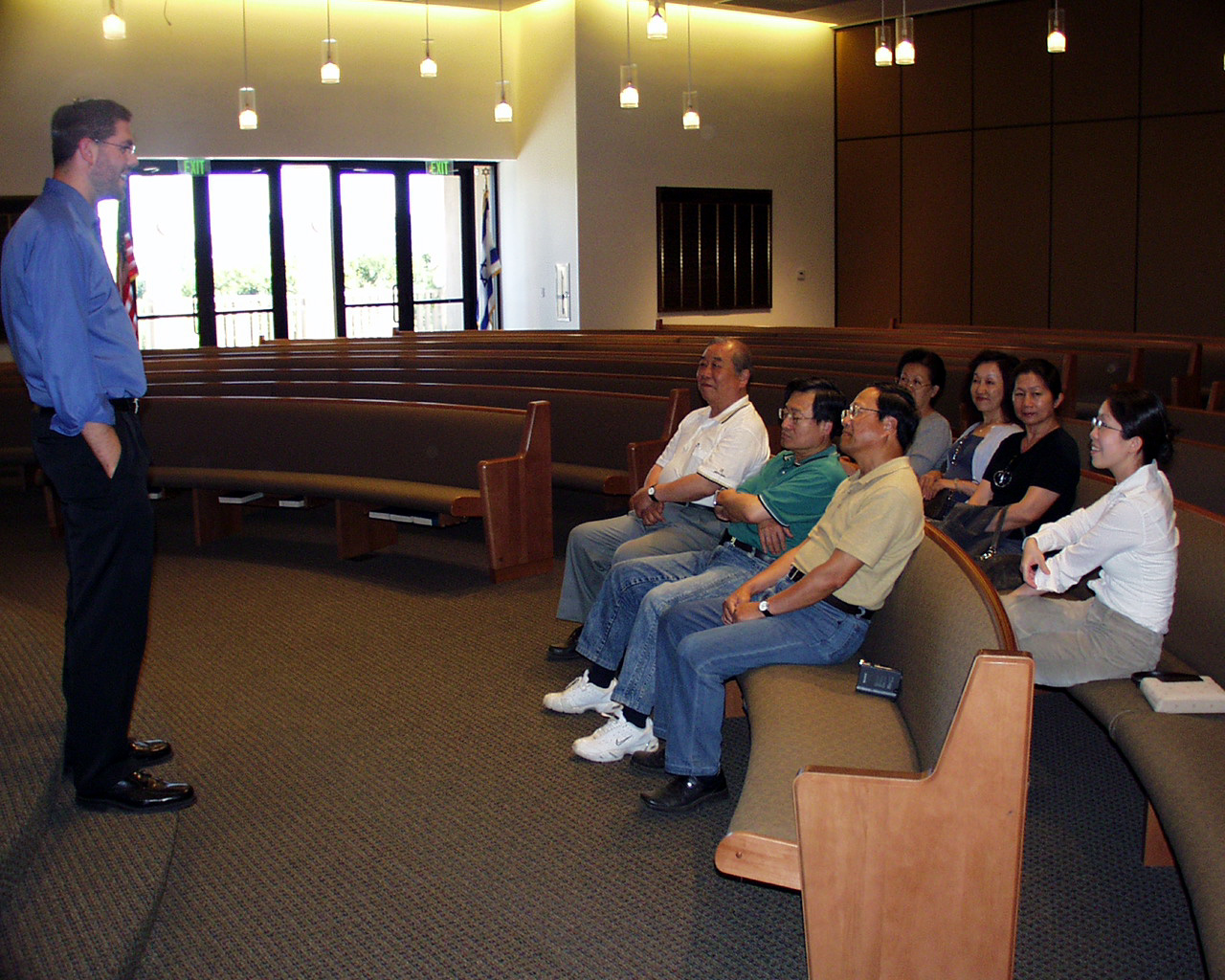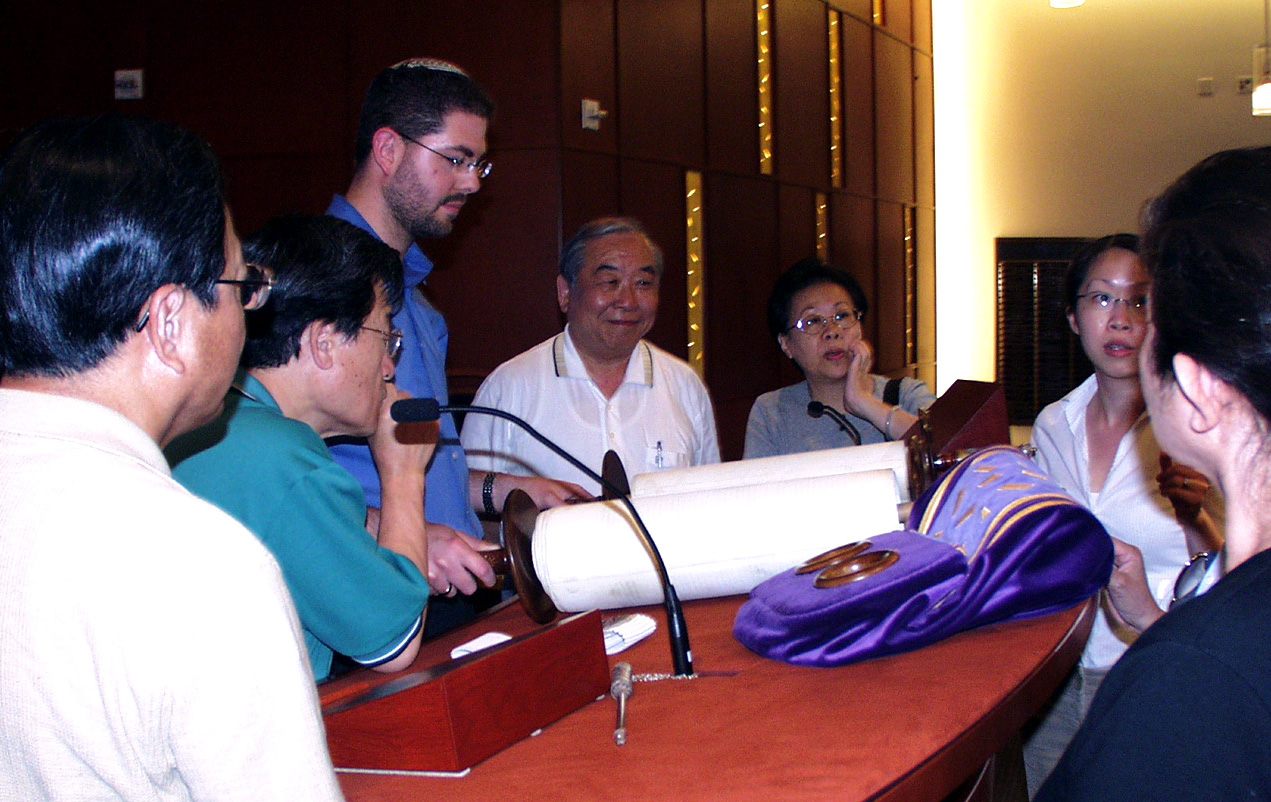|
By Donald H. Harrison
ENCINITAS, Calif.—Our makhetunim from Taiwan have been visiting their
daughter (who is our beloved daughter- in-law!) Hui-Wen and our son, David, and
while here, they and some traveling companions wanted to see a synagogue —
even as Nancy
and I, when visiting Taiwan, had been interested in seeing some
Confucian and Buddhist temples.
Sisterhood president Pat Feldman, whom I'm proud to claim as a cousin, helped
make arrangements at Temple
Solel, a Reform congregation located in the
Cardiff-by-the-Sea section of the coastal suburb of Encinitas. It is the
closest large congregation to David's and Hui-Wen's home.
Rabbi Jeff Brown, the assistant rabbi of Temple Solel, graciously agreed to show
the Taiwanese group around the sanctuary and grounds, and to answer their many
questions. Hui-Wen, a
business consultant and piano instructor, served as the interpreter. I was delighted for the
opportunity to listen in.
Hui-Wen's father, Wen-Shion Chang, and mother, Ming-Hui Chang, and the two
couples traveling with them all are highly educated people. Her father
had served as president of a succession of universities in Taiwan, and now, in
"retirement" chairs the board of directors of Ching-Wen University and
heads a board of visitors that inspects other universities on behalf of the
Ministry of Education.
The two men traveling with them, Chao-Ping Chang and Wen-Long Chiou, both
are executives with foreign businesses operating branches in Taiwan. One
deals in chemicals, the other in sports equipment. Hui-Wen introduced her
own mother and the wives of these men—Shu-Chin Chang Wu and Keui-Lan Chiou
Huang— as "the best moms" to Rabbi Brown.
Prior to David's and Hui-Wen's marriage in San Diego by Reconstructionist Rabbi
Alexis Roberts, opportunities for Hui-Wen's parents and friends for exposure to
Judaism were quite limited. A comparative handful of Jews live in all of Taiwan,
far fewer than the more than 800 families who are members of Temple Solel.
 "What do you call your God?" was the first question put to Rabbi Brown
after he took the group into Temple Solel's beautiful new sanctuary, which is
decorated in a kabbalistic motif depicting the sparks of creation. "What do you call your God?" was the first question put to Rabbi Brown
after he took the group into Temple Solel's beautiful new sanctuary, which is
decorated in a kabbalistic motif depicting the sparks of creation.
"Traditionally in Judaism, no one knows the exact name," the rabbi
responded. "It is so special that no one is supposed to know how to
correctly pronounce it, but the name that we use most often is 'Adonai,' which
conveys the sense of 'Lord.' The actual unpronounceable name of God
has to do with God's eternal nature."
Brown brought a Torah out of the Aron Kodesh and spread it out for the
visitors to see on the reader's table.
"What is the difference between Torah and Bible?" asked one of the
visitors through Hui-Wen.
"The Torah is the first five books of the Bible," the rabbi
responded. "This scroll is made in a certain way using certain kinds
of animal skins and a certain kind of ink."
"Animal skins?" they verified.
"Yes," the rabbi confirmed, going on to say that the
Torah is written in ancient Hebrew, a language that is "very similar to the
language spoken today in Israel. We read from the scroll during services
every Saturday morning and it is a high honor for people to read from the scroll
or to pronounce the blessings that are said before and after each reading."
"Can all Jews read the Torah?" one questioner wanted to know.
"Many Jews but not all Jews can read the Torah," the rabbi responded.
"It is not uncommon for many Jews to be able to read it without
understanding it."
"What about people who don't know Hebrew?"
The rabbi picked up a Chumash, and showed how Hebrew was written on one
page, and the English translation was printed on the facing page, with
commentaries or explanations on the bottoms of those pages. "Traditionally,
Hebrew books are written from right to left so the books open that way as
well," said the rabbi.
"Chinese is the same," commented Hui-Wen. The Mandarin form of
Chinese is spoken by many people in the island nation of Taiwan, which
also is known as the Republic of China.
The rabbi read a passage from where the Torah had been opened. The passage
dealt with the fact that the Levites would serve as religious functionaries in
lieu of first-born sons.
After he explained the passage briefly, the Taiwanese visitors asked why he used
the pointer to read from the Torah. He responded that one uses the
instrument known as a yad (Hebrew for "hand') in order to avoid
smudging the Torah.
Their glances turned to Rabbi Brown's multicolored kippah. Dr. Chang said
that whereas he had seen the black variety of skullcap worn by Jews, he was
unfamiliar with the multicolored variety. What is the difference? he
asked.
"Only that I have good fashion sense," quipped Rabbi Brown. He
added that from a religious standpoint there was no difference, although
"those who are more religiously traditional have a more conservative sense
of fashion, so they prefer them to be black and plain."
"Why do Jews wear hats inside?" came a follow-up question.
"There is an American custom that says when you go inside a
building, it is a polite thing to do to take off your hat, but in Judaism it is
the opposite. When we are going about our daily business, whether inside
or outside, the polite thing to do is to cover one's head as a sign of humility,
out of respect for God, as a reminder that there is Something Above there that
is more important than anything."
A questioner asked how many Jews there are in the world.
"Between 13 and 15 million," the rabbi responded. He added that in the
United States about 40 percent are affiliated with synagogues, and of those
nearly 40 percent are Reform, about 33 percent are Conservative, 21
percent are Orthodox and 3 percent are of other descriptions. In Israel, however, the percentages are different.
"Can non-Jews become Jews?" it was asked.
"Oh sure, to convert to Judaism it is possible," Rabbi Brown
responded. "Unlike some forms of Christianity, Judaism does not
actively try to get people to convert, but if someone is interested and
approaches us, absolutely. Every rabbi in every synagogue is a little
different but approximately it takes one year of study and reflection and
deciding if it is right for them or not."
The rabbi said at Temple Solel approximately one-third of the membership are
families with a spouse that either is not Jewish or is in the process of
becoming Jewish. Some of these families are Asian—in fact, "ten percent
of the American Jewish population today is non-white."
Although Dr. Chang speaks English, he asked Hui-Wen to relate an incident for
him. He was with an international group of educators who traveled to South
Africa a number of years ago. Among the group was a president from one of the
Israeli universities. On meeting the president of a university in Cape
Town, and learning that he was Jewish, the Israeli university president
initiated arrangements to teach Torah to him and his family. The Israeli
president said it was his mission, or responsibility, to teach Torah anywhere he
might meet a Jewish family. Could the rabbi elaborate upon this custom?
Rabbi Brown responded that "teaching others about the religion, and
specifically one's children, is very important in Judaism. It sounds like
this person maybe took it very literally; I don't know that I would go into a
stranger's house and talk to the children like that, but the value of education
is very important."
The rabbi replaced the Torah into the Ark, then toured us around the rest of the
synagogue campus, which includes school buildings, a library, social hall, and
playgrounds for three different age-levels.
"Are the Ten Commandments mentioned in the Torah?" asked one of the
gentlemen, who previously had indicated some familiarity with Christianity.
"Yes," Rabbi Brown responded. "The Christian Bible includes
everything in the Jewish Bible plus Christian Scriptures, or the New
Testament."
Looking at the sign identifying the Wax Family Plaza, the party from Taiwan
inquired as to the identity of the Waxes that they should be so honored.
Were they famous in Judaism?
Rabbi Brown said the Waxes are a local family who are well known as
philanthropists. He said it is not uncommon at Jewish institutions to name
facilities after financial benefactors.
Looking inside the preschool, one of the visitors asked whether Hebrew was
taught there. "A little but not a lot," Rabbi Brown
responded. "Later, when the kids come for supplemental education, two
hours Wednesday afternoon and two hours Sunday, that is when they learn
Hebrew."
"Is Jewish education free?"
"Sadly not, but if there are people who can't afford it, we help
them," Rabbi Brown said. "Generally people need to become
members and to enroll their children, because it is very expensive to have a
school."
Dr. Chang smiled broadly. The former university president knew all about that!
|


